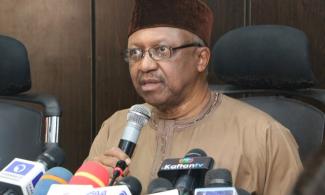
“We are losing up to 50,000 women every year in childbirth, and that is a huge emergency. We are losing over 900,000 children every year,” the minister said at the inauguration of the first batch of core responders in Abuja on Friday.
The Minister of Health, Dr Osagie Ehanire, has reiterated the government’s commitment to responding to public health emergencies, while noting that more than 50,000 women die during childbirth in Nigeria.
“We are losing up to 50,000 women every year in childbirth, and that is a huge emergency. We are losing over 900,000 children every year,” the minister said at the inauguration of the first batch of core responders in Abuja on Friday.
He added, “According to reports, we have 6,000 people killed in road traffic accidents every year and 17,000 from accidents who are maimed and permanently disabled every year. All of these are serious emergencies.”
At the graduation ceremony of the 82 core responders in Abuja on Friday, Ehanire said at least 100 emergencies occur across Africa per week, causing damage to health and economic systems.
He said the responders would respond to emergencies within 24 to 48 hours of their occurrence.
The core responders were trained under the theme “Capacity Building, Learning and Training to On-Board the AVoHC Strengthening and Utilising Response Groups for Emergencies (SURGE) Team”.
According to Ehanire, public health emergencies are already running quietly in the country.
According to the News Agency of Nigeria, the minister however said the SURGE initiative promotes the availability of equipment, well equipped teams with everything streamlined to respond to emergencies within the specified time frame.
He said they would also fully align with the concept of a resilient and sustainable health system for improved health outcomes and universal health coverage.
The WHO Country Representative in Nigeria, Walter Molumbo, said the organisation is committed to strengthening regional and sub-national capacity to prepare and respond to public health emergencies in an increasingly globalised, unionised and connected world.
He added that people always being on the move was creating an amplifying threat of multiple infectious hazards, in addition to natural disasters, conflict, climate change and other emergencies.
He said the programme was aimed at providing national and subnational Rapid Response Teams (RRTs) with key knowledge and tools needed to detect and effectively respond to public health emergencies as they occur.
He explained that “the SURGE programme identified five countries among which Nigeria is being chosen, and in Nigeria, we have six states that have been selected to kick-start this process.
“We will be able to scale up the SURGE in the six pilot states but also go beyond to make sure that the entire country benefits from this initiative.”
The six pilot states are Abia, Yobe, Kano, Lagos, Edo and the Federal Capital Territory.